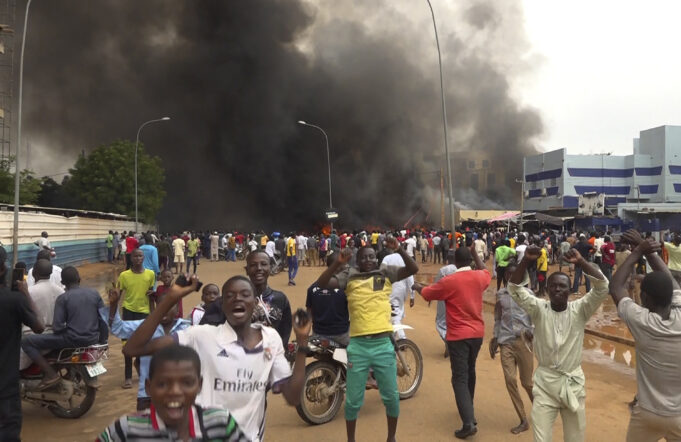Africa’s coup belt is growing. The coup d’état in seven African countries has been described as a sign of failed democracies in the affected countries. According to a report in the Daily Maverick, censuring leaders for coups is only a first step.
Businessday.ng, a Nigerian business and financial news website, describes the seven countries experiencing “military interregnum,” including Guinea, Burkina Faso, Mali, Niger Republic, Chad, Sudan, and Gabon, as having a “lack of purposeful leadership.”
With many citizens being crowded out of the dividends of democracy, military leaders are exploiting disenchantment with democratic leadership amid deteriorating economic conditions, the website noted.

African and international actors should tackle the poor quality of democracy and governance. The debate about democracy and governance in Africa must evolve. “Priorities (should be) shifted to the quality of electoral processes, the value of term limits, but also legitimacy, performance, and accountability in political and economic governance. Social discontent, largely expressed through protest, has (in the past) been met with varying degrees of suppression, co-option, and consolidation of the status quo,” notes the Institute for Security Studies.
Whether that fully applies to the recent rash of African coups is debatable. “The seeming support of militaries taking over is an indirect support, it is not support (necessarily) for the military,” argued Leena Koni Hoffmann, an Africa program associate fellow with London-based think tank Chatham House.
But the fact that in several countries citizens have taken to the streets to cheer the disruption of “democracy,” stands for critical analysis. “In Niger, stadiums have been filled by supporters of the military government after its July 26 coup.
In 2021, there was also jubilation on the streets of Conakry after the Guinean military removed Alpha Conde, the president who extended his stay in office despite stiff opposition from the citizens,” reported Al Jazeera. While in Sudan, the coup of the military-run interim government, two days after this writer left the country, spoke to the military with its significant economic interest, squashing the arrival of a civilian-led government.
This pattern of reacting to military takeovers with optimism is an expression of deep-seated frustration with civilian leaders in Africa, some experts argue.
In Francophone Africa or countries formally colonized by France, the civilian population points with glee to the possible uprooting of the enduring trappings of French influence—“from thousands of troops still stationed in Africa to a raft of longstanding mining concessions benefitting French companies, and the CFA franc, requiring West and Central African members to deposit half their foreign exchange reserves with the French treasury,” reported VOA.
Another reason for jubilation is the hope for widespread and worsening corruption being finally uprooted. This particularly corrosive environment has historically left people increasingly dissatisfied with political systems that are yet to deliver on their aspirations to live in societies that are democratically and accountably governed, noted businessday.ng.
This is partially due to a conflict of interest. According to Senegalese economist Dr. Ndongo Sylla, most of the people who serve as prime ministers or ministers of finance come from global financial circles—and they will never go against the interests of global finance.
“The guys in APIX (Agency for the Promotion of Investment and Major Works) are people who want to please the World Bank, the French or European development agencies … who want to be perceived as good managers,” he said.
Discussing coups without explaining their Western neocolonial origin is doing a disservice. Coups engineered by the U.S. and neocolonial France, to guarantee access to mineral and natural resources, were part and parcel of how Western powers maintained sway over their former colonies.
According to Susan Williams 2021 book, “White Malice: The CIA and the Covert Neocolonization of Africa,” U.S. President Dwight D. Eisenhower signed off on a plot to assassinate, Congo’s democratically-elected president, Patrice Lumumba.
Koojo S. Lewis’ 1967 book “How America toppled Nkrumah,” cites several documented U.S. instigated coup plots against President Kwame Nkrumah of Ghana.
The BBC recently ran a headline, “Are military takeovers on the rise in Africa?” Power grabs or unconstitutional military takeovers or coup d’états appear on the rise. Once used surreptitiously, like in the case of France to unseat heads of African states wanting to control the economics as well as the politics of their countries, these actions are now open.
According to the New York Times former Africa correspondent Howard K. French, “Since its 1964 intervention in Gabon, France, has intervened militarily on the continent every other year on average. Paris has repeatedly sent troops into action in Chad, flown in paratroopers to rescue French and Belgian nationals in Zaire and help put down an insurrection there, and used its forces to replace political leaders in the Central African Republic.”
Follow @JehronMuhammad on X, formerly known as Twitter













